Description
Male. Upperside brown, with a purplish reflection in certain lights. Forewing with a somewhat triangular-shaped orange patch in the upper disc, variable in size in different examples, with two short blackish bars in it, the inner the shorter, where the orange space runs sufiiciently inwards there is another bar outwardly oblique right across its inner side. Hindwing with the abdominal space broadly rufous-grey, the anal patch dull greyish-orange, with two somewhat obscure blackish small spots; tails black, tipped with white, their bases orange. Marginal line of both wings blackish brown. Cilia white. Underside pale, dull ochreous-grey, bands pale ochreous-brown, all with some silvery scales down their centers, some of the bands of the forewings with dark linear edgings. Forewing with a small spot in the cell, a bar across the end extending to the costa, a band from the middle of the costa, outwardly oblique to the sub-median vein to near the hinder angle where it is somewhat close to the narrow sub-marginal band, two short bands from the costa between them, the inner one the shorter. Hindwing with an obscure basal band which runs close down the abdominal margin, ante-medial, medial, and post-medial bands from the costa, the two outer ones abruptly curved inwards above the anal patch to the abdominal margin, the postmedial band extending only to vein 4, and a sub-marginal band, all these bands somewhat obscure; anal patch slightly paler than the rest of the wing. Female. Above and below very similar to the male, but the anal patch on both sides is bright orange-red, and the anal spots larger. Antennas black, with white segmental dots at the sides; head and body above and below concolorous with the wings.

Halpe homolea, the Indian ace or Ceylon ace, is a butterfly belonging to the family Hesperiidae.
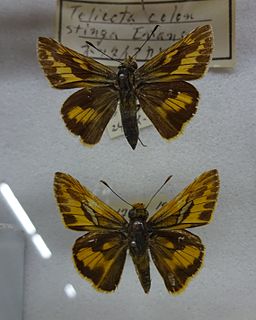
Telicota colon, commonly known as the pale palm dart or common palm dart, is a butterfly belonging to the family Hesperiidae found in India to Australia.

Bindahara phocides, the plane, is a small butterfly found Indomalayan and Australasian realms that belongs to the lycaenids or blues family.

Amblypodia anita, the purple leaf blue or leaf blue, is a lycaenid or blue butterfly found in South Asia and Southeast Asia, including Sri Lanka, India, Myanmar, Malaysia, and Java. The species was first described by William Chapman Hewitson in 1862.

Arhopala abseus, the aberrant oakblue or aberrant bushblue, is a species of lycaenid or blue butterfly found in Asia.
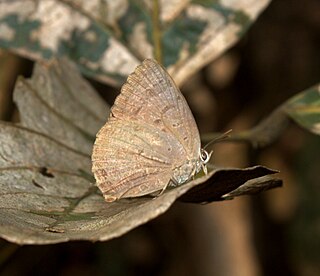
Arhopala atrax, the dark broken-band oakblue or Indian oakblue, is a species of lycaenid or blue butterfly found in the Indomalayan realm.

Zinaspa todara, the silver streaked acacia blue, is a species of lycaenid or blue butterfly found in South Asia.
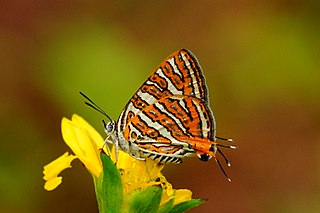
Cigaritis vulcanus, the common silverline, is a species of lycaenid or blue butterfly found in Asia. It was first described by Johan Christian Fabricius in 1775.
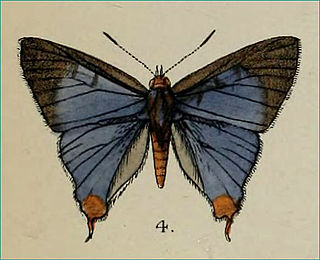
Cigaritis abnormis, the abnormal silverline, is a species of lycaenid or blue butterfly found in south India and Pakistan.

Cigaritis lilacinus, the lilac silverline, is a species of lycaenid or blue butterfly found in Asia.

Zesius chrysomallus, the redspot, is a species of lycaenid or blue butterfly found in Sri Lanka and India.

Pratapa deva, the white royal, is a lycaenid or blue butterfly found in the Indomalayan realm. The species was first described by Frederic Moore in 1857.

Tajuria melastigma, the branded royal, is a species of lycaenid or blue butterfly found in the Indomalayan realm.

Horaga onyx, the common onyx, is a species of lycaenid or blue butterfly found in Asia.

Deudorix perse, the large guava blue, is a species of lycaenid or blue butterfly found in the Indomalayan realm. It was described by William Chapman Hewitson in 1863. The larva feeds on Randia dumetorum.

Rapala varuna, the indigo flash, is a species of lycaenid or blue butterfly found in the Indomalayan realm and the Australasian realm.

Zeltus is a butterfly genus in the family Lycaenidae, the blues. It is monotypic containing the species Zeltus amasa, the fluffy tit, a small butterfly found in Indomalayan realm. The butterfly is found in India, specially the Western Ghats, Sikkim to Assam. It can also be found in Myanmar, Thailand, West Malaysia, Sumatra, Borneo, Java and the Philippines.

Creon is a monotypic butterfly genus in the family Lycaenidae. Its sole species is Creon cleobis, the broadtail royal, which is found in South Asia.
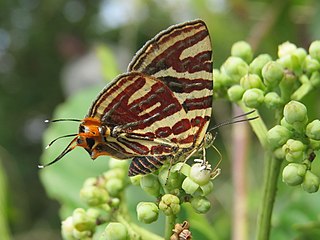
Cigaritis lohita, the long-banded silverline, is a species of lycaenid or blue butterfly.

Deudorix isocrates, the common guava blue, is a butterfly in the family Lycaenidae. It was described by Johan Christian Fabricius in 1793. It is found in India, Sri Lanka and Indochina in the Indomalayan realm. Other common names include pomegranate butterfly, and anar butterfly.






















